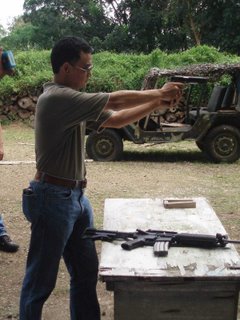The blogs and boards have been awfully quiet about last Friday night's NBI raids on a couple of semi-regular poker games around the metro. It's Monday morning, and only
Maverick has touched on Friday's events in any detail.
Perhaps it's because none of us have any real details on the raids. I've received a few phone calls with a tidbits of "info" here and there about the raids. I can't confirm any of them, as I thankfully wasn't around to have to deal with the stormtroopers. All I can do is wish those involved the very best. Poker players are not criminals; they are simply seeking venues in which to sociably improve their skills, have a good time, or in the case of the pros, ply their trade. The trauma of an NBI raid would shake up the social players, that's for sure, and is certainly a setback to further growth in the market.
The reality is this: PAGCOR runs a cardroom in the Metro, specifically at the Airport Casino Filipino in Paranaque. The room is almost 1 year old (opened December 17), and boasts 11 tables, spreading 20/40, 50/100, 100/200 NLHE.
I was one of the folks involved in designing and launching that cardroom.
Its early incarnation delivered value for the nascent poker community in one MAJOR respect: it was legal. It was situated in a professionally run PAGCOR casino. It was championed whole-heartedly by then Senior Branch Manager JB Bangsil (now running the Hyatt), and his great staff, from operations to marketing.
When I say
early value, I mean that specifically. I ceased my involvement with the card room (save tournaments, which I helped them operate, along with Marco and Ed of PBT, until August, 2006) when I began to depart philosophically with its policies. On the cash game side, I sensed an urgency on PAGCOR's topside to earn as much revenue from those tables as quickly as possible. Thus my concerns about the long-term wisdom P10K max buy-ins in a 20/40 NL table, among other things like maximum rake levels, went largely unheeded.
Over the next few months, it became clear that the "grinder" market, those with modest bankrolls and sophisticated enough to know when they're underdogs in a given environment, would be looking elsewhere for their action.
So here we were, early in 2006, with
one legal room in the metro (in the southern metro, no less, where the population is clearly thinner than the north), spreading games under policies that price many, many players out of regular play.
Nature abhors a vacuum. It naturally became realistic for others to spread games that were more accessible, both from a proximity and financial standpoint. They succeeded. They got raided. Guess what? They're unlikely to go away.
Poker is inherently and historically a home game. As it bled into popular culture, it found itself a major part of the casino landscape (it was always there, but a always a bit-player). But it remains ingrained in the home. People do not tend to view friendly poker games, even when held outside a traditional residence, as frightening as, say, an underground baccarat game.
Many of my friends have very publicly stated that the private games feed the government games, as they develop and promote the game to the markets they easily reach. The government's job in such a value-and-market building relationship would be to spread accessible, legal games in more than one venue. That would work.
The casinos ought to do everything in their power to protect players from going bust too soon. spreading only NLHE with big max buys relative to the blinds may earn rake revenue at a faster clip, but it'll kill Beginner Bob's bankroll faster than you can say "All-In".
I'm told that one of the venues shut down last Friday featured a very small game, accessible to the learners and end-of-the-week-unwinders. These guys weren't making loads of cash off this game...but they were building up a playing community.
Anyway, it is what it is...my comments above are simply my opinions, and I hope those affected this weekend got out painlessly.



